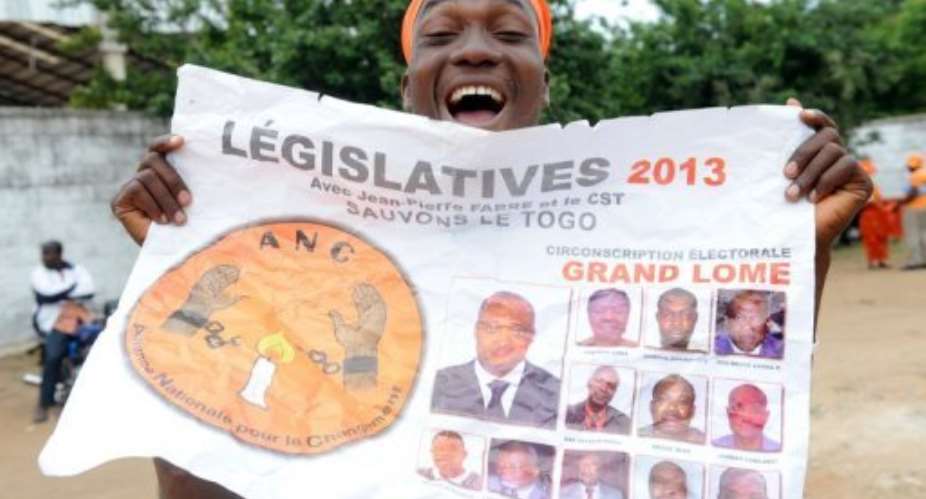LOME (AFP) - Voters in Togo queued up Thursday to cast ballots in parliamentary elections delayed by months of protests, with the opposition seeking to weaken the ruling family's decades-long grip on power.
Roughly two hours after polling stations opened, the most prominent opposition leader in the west African nation voiced concern over some initial hiccups, but said he was confident the vote would be clean.
Jean Pierre Fabre, running for a parliamentary seat, said several polling stations opened after the agreed time of 0700 GMT and ballot materials were not delivered on schedule in places.
"Despite that, I remain confident" in the process, he told AFP.
Crowds of several hundred had built up at some polling stations, with some complaining their names could not be found on voter lists.
The polls mark the latest step in the impoverished country's transition to democracy after Gnassingbe Eyadema's rule from 1967 to his death in 2005, when the military installed his son Faure Gnassingbe as president.
Gnassingbe has since won elections in 2005 and 2010 in the country of six million people, but the opposition has denounced both as fraudulent.
Thursday's elections are the first legislative polls since 2007, when Gnassingbe's party won 50 of 81 seats. Ninety-one seats will be decided this time.
The voting was initially scheduled for October 2012, but was delayed amid a series of protests by a coalition of opposition and civil society groups known as Let's Save Togo, which has been pushing for sweeping electoral reforms.
Yaovi Adjo, a 32-year-old security guard, said he "had no confidence that the election would be transparent" because the opposition's proposed reforms were rejected.
But Alain Maza, 31, who arrived at a polling station in the capital before voting began, insisted the process would be "transparent" thanks in part to foreign observers.
The head of the African Union's observer mission, Guinea's Prime Minister Kabine Komara, told AFP the process seemed smooth through the early hours of voting.
The opposition "must be tolerant but also watchful about certain things" that may go wrong, he said.
Many of the protests ahead of the vote were dispersed by security forces firing tear gas, while some 35 people, mostly opposition members, were detained in the run-up to the polls in connection with suspicious fires at two major markets.
Thirteen opposition members held over the fires have since been released, including five candidates in Thursday's polls.
Despite the protests in recent months, the campaign ahead of the vote has been largely peaceful.
Opposition members had at first threatened a boycott of the election, but agreed to participate after negotiations which allowed them access to polling places and granted them state financing for campaigning.
Gnassingbe's party, formerly the RPT but now known as UNIR (Union for the Republic), has called on voters to give it a comfortable majority to continue work in areas such as infrastructure improvements.
The president should be given room to govern to continue to "improve the quality of life for the Togolese," said Patricia Dagban-Zonvide, minister of women's advancement and head of the ruling party's list of candidates in Lome.
A number of the best-known opposition candidates have organised themselves into two separate coalitions, Let's Save Togo and Rainbow. Fabre's ANC party is running with Let's Save Togo.
The party of Gilchrist Olympio, the long-time opposition leader and son of the country's first post-independence president, is also taking part, though he is not himself a candidate.
Olympio, whose father was assassinated in a 1963 coup in which the current president's father took part, agreed to a deal in 2010 to have his faction of the opposition join Gnassingbe's government.
Full results are not expected for several days.
West African bloc ECOWAS is deploying 80 observers for the vote, while the African Union has sent 32.
The parliamentary polls are considered a key indicator ahead of a presidential election scheduled for 2015.
Presidential polls in 2005 were marred by deadly violence, while 2007 and 2010 elections were viewed by observers as significant steps forward.





 2024 elections: Resign if you can't be faithful to party - Sagnarigu NDC PC desc...
2024 elections: Resign if you can't be faithful to party - Sagnarigu NDC PC desc...
 Five arrested, remanded over alleged murder of two police officers at Transacco
Five arrested, remanded over alleged murder of two police officers at Transacco
 Tax exemptions better than incentives for churches – Tax Analyst tell Bawumia
Tax exemptions better than incentives for churches – Tax Analyst tell Bawumia
 Transport Minister sues Law Platform Editor for defamation
Transport Minister sues Law Platform Editor for defamation
 Voter registration: Police arrest NPP Treasurer for Mpohor for registering minor
Voter registration: Police arrest NPP Treasurer for Mpohor for registering minor
 "This nonsense must stop" — Lawrence Tetteh vows to march to Jubilee House over ...
"This nonsense must stop" — Lawrence Tetteh vows to march to Jubilee House over ...
 2024 elections: “If indeed you stand for peaceful elections the time is now for ...
2024 elections: “If indeed you stand for peaceful elections the time is now for ...
 I have the attributes to be president of this country — Bernard Monarh
I have the attributes to be president of this country — Bernard Monarh
 Cecilia Dapaah saga: ‘Turf war’ between AG, EOCO, OSP indicates they’re not ‘cor...
Cecilia Dapaah saga: ‘Turf war’ between AG, EOCO, OSP indicates they’re not ‘cor...
 Ghana will become the first African country to embrace blockchain-powered gover...
Ghana will become the first African country to embrace blockchain-powered gover...
